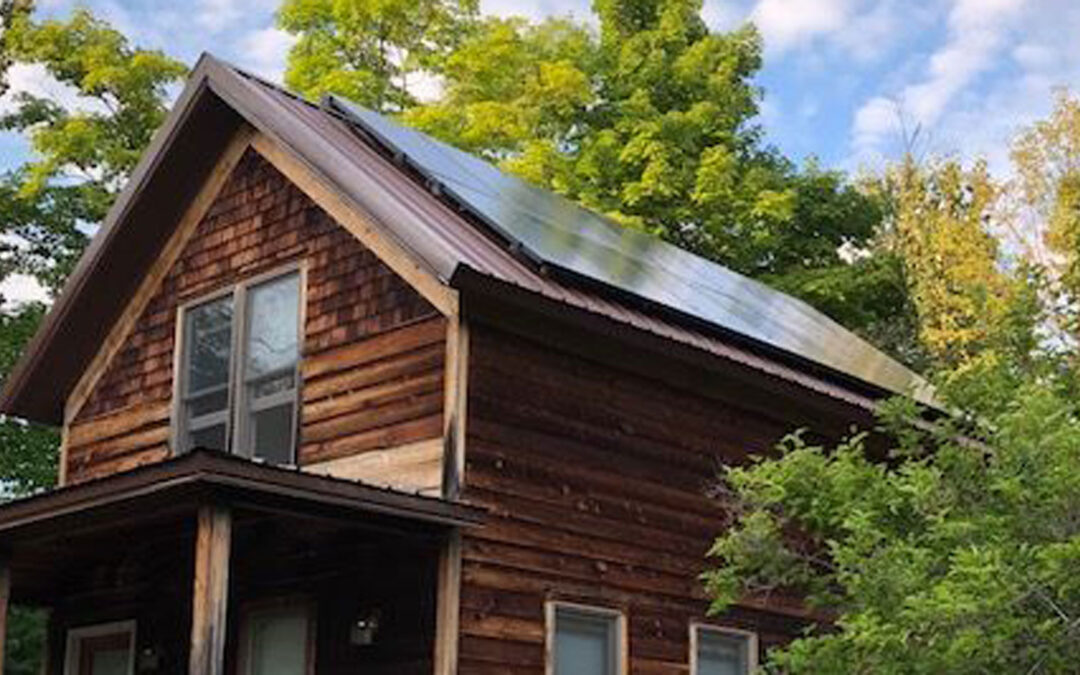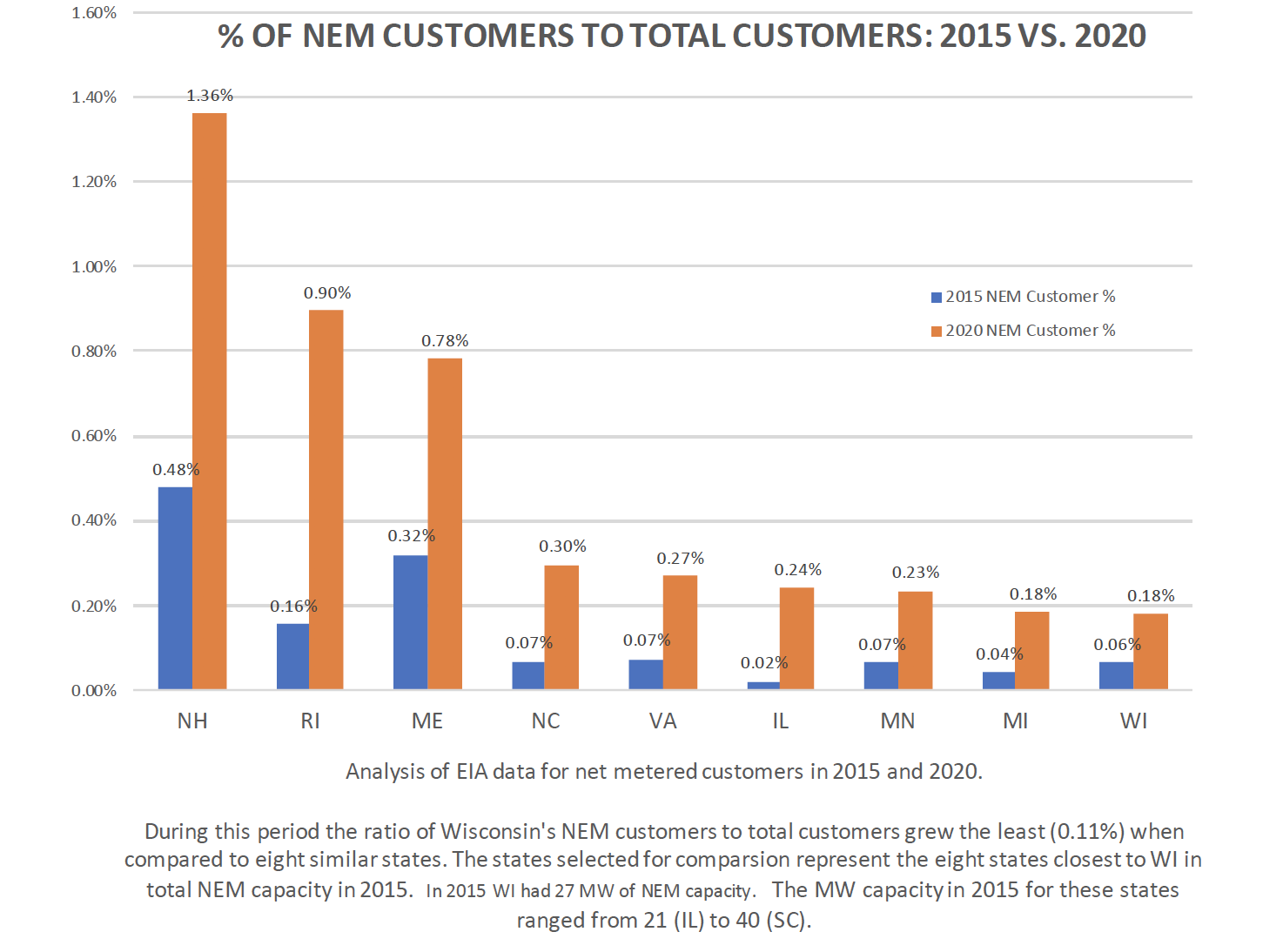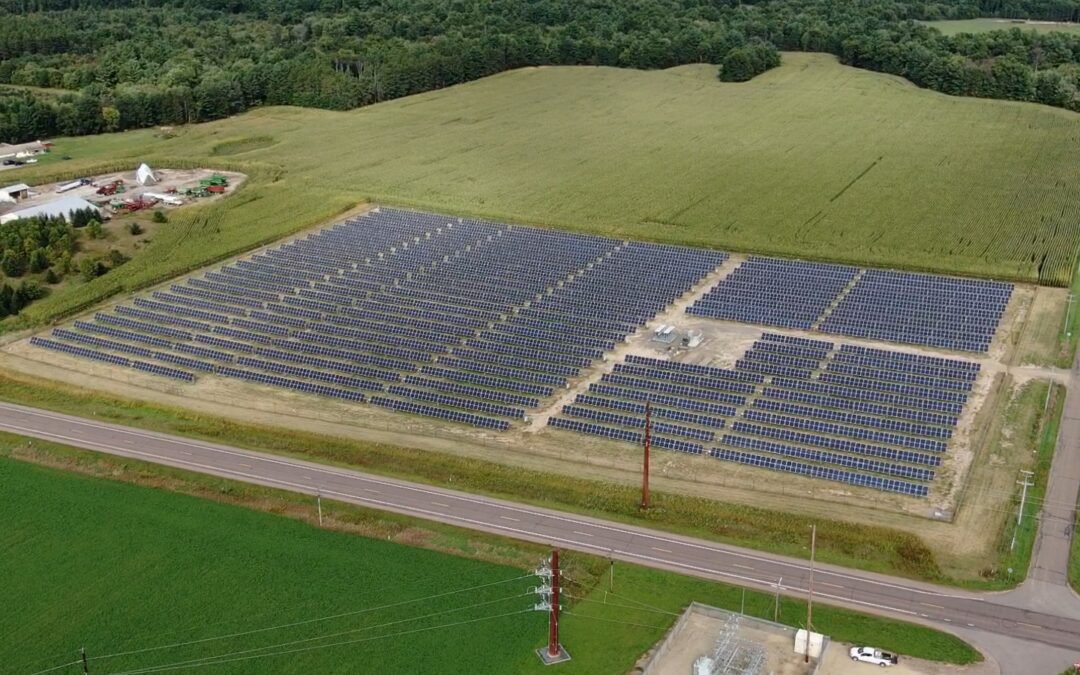
by Michael Vickerman | Oct 27, 2021 | Advocacy, Community, Community Solar, Local Government, Policy, RENEW Wisconsin, Renewables, Solar, Sustainability
For decades, utility investments in power plants and transmission lines have been predicated on the concept of economies of scale. The theory behind it is beguilingly simple: the larger the installation sought by an electric utility, the lower the unit cost of the investment, which utility planners and regulators regard as a measure of economic efficiency. When loads are growing, the “bigger is better” paradigm is often an economically rational fit for electric utilities seeking to recover large-scale capital investments in fossil generation over the broadest possible cohort of current and future customers.
But solar power, the default resource option for electric providers today, is a somewhat different animal due to its scalability. Yes, economies of scale can certainly reduce the unit price of solar generating capacity, but other on-the-ground factors can influence the economics of this resource. These factors include but are not limited to the cost of acquiring site control of the host properties and obtaining all the necessary approvals to construct the project. Interconnection costs can be high as well, especially for larger projects requiring additional land and approvals to supply power to the grid.
These thoughts came to mind after visiting two smaller solar farms that started producing power this year. The first project, called Strobus Solar, was developed by OneEnergy Renewables and serves Jackson Electric Cooperative. The second installation, O’Brien Solar Fields, was one of the stops in this September’s Ride with RENEW bicycle tour. Developed by EDF Renewables and owned by Madison Gas and Electric (MGE), this 20 MW solar farm in Fitchburg supplies electricity to seven MGE customers under long-term contracts.
At a Glance
Solar For the Distribution Grid – 2021 |
| Project name |
Strobus Solar |
O’Brien Solar |
| County of location |
Jackson |
Dane |
| Capacity (in MWac) |
1.5 |
20 |
| Project developer |
OneEnergy Renewables |
EDF Renewables |
| Project owner |
Greenbacker Capital |
Madison Gas + Electric |
| Utility territory |
Jackson Electric |
Madison Gas + Electric |
| General contractor |
Arch Electric |
Boldt Construction |
| Landowner |
Northern Family Farms |
O’Brien Brothers Farm |
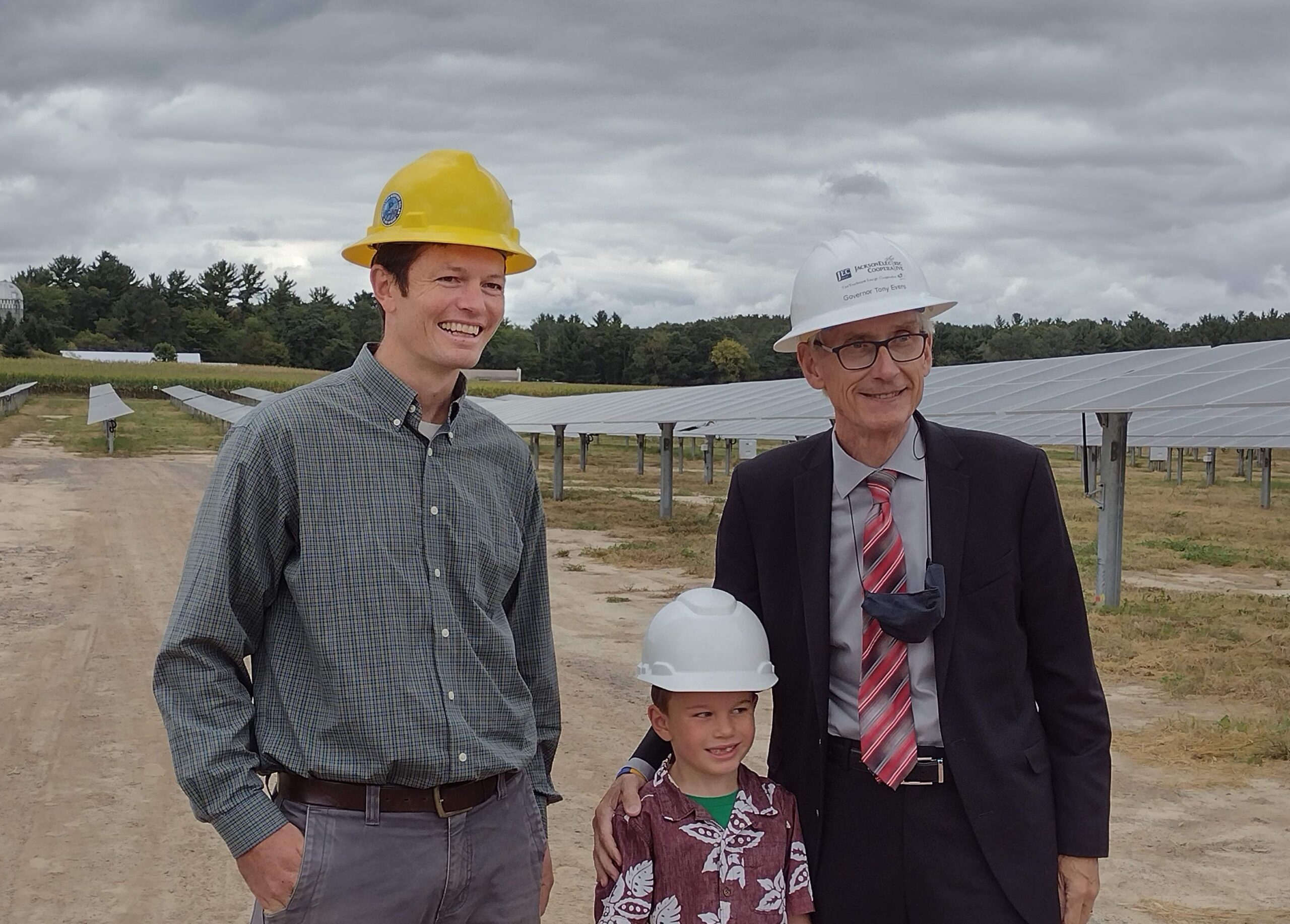 Governor Evers and the Project Developer, Eric Udelhofen, from OneEnergy Renewables at the Ribbon Cutting Ceremony for the Strobus Solar project.
Governor Evers and the Project Developer, Eric Udelhofen, from OneEnergy Renewables at the Ribbon Cutting Ceremony for the Strobus Solar project.
Strobus – A Mastodon Solar project
Occupying a mere 12 acres, Strobus Solar is located about six miles north of Black River Falls and is tucked into a compact parcel framed by evergreen trees and U.S. Highway 12. On a cloudy September day, more than 50 people attended a ribbon-cutting ceremony for the Strobus project, one of eight solar farms in southeast Minnesota and west-central Wisconsin that make up OneEnergy’s Mastodon Solar portfolio. With a combined 17 megawatts (MW) of AC-rated capacity, all eight Mastodon solar farms are located in the territory served by rural electric cooperatives.
As noted on OneEnergy’s website, “the electricity generated by each project will be purchased by the local participating electric cooperative, resulting in savings on energy supply and increased resiliency. These savings will be passed onto the cooperative’s members. The available Renewable Energy Credits will then be sold separately to visionary buyers committed to ensuring their renewable energy procurement dollars are devoted to new projects that serve local communities.”
Of the four Mastodon projects located in Wisconsin, Strobus is the second to be energized this year, following Blue Prairie, a 2.5 MW installation southwest of Black River Falls. The other two, Stromland and Shamrock, should be operating before the end of this year. Plymouth-based Arch Electric is the general contractor for all four Wisconsin projects.
Governor Evers spoke at the ribbon-cutting ceremony, along with representatives of Jackson Electric Cooperative, Arch Electric, and Northern Family Farms, the participating landowner. Based in nearby Merillan, Northern is Wisconsin’s largest Christmas tree grower, operating on more than 7,000 acres. After the prepared remarks, OneEnergy and Arch opened the gates to let Governor Evers and other guests circulate through the project and ask questions.
On one corner of the Strobus parcel is the substation that feeds the solar-generated electricity directly into the wires overhead. Though the equipment onsite is brand-new, low-growing grassy vegetation has already been established, covering the entire project footprint. After three years, the mix of deep-rooted, primarily native plants will provide a healthy habitat for birds, insects, and other species. At nearby Blue Prairie, sheep are already grazing around and under the 7,000 panels installed there.
Strobus is expected to generate about 3,000 megawatt-hours of electricity a year. But the Renewable Energy Credits associated with that output will not flow to Jackson Electric. They will instead be sold to Native, a Public Benefits Corporation, through its New Renewables Portfolio.
According to Native’s website, the purpose of the Portfolio “is to enable Renewable Energy Credit (REC) buyers to play a causal role in actualizing new renewable energy projects. Native has committed to a 10-year renewables purchase agreement with Strobus, LLC on behalf of Portfolio investors. Without this type of long-term REC purchasing agreement, this project would not be economically viable.”
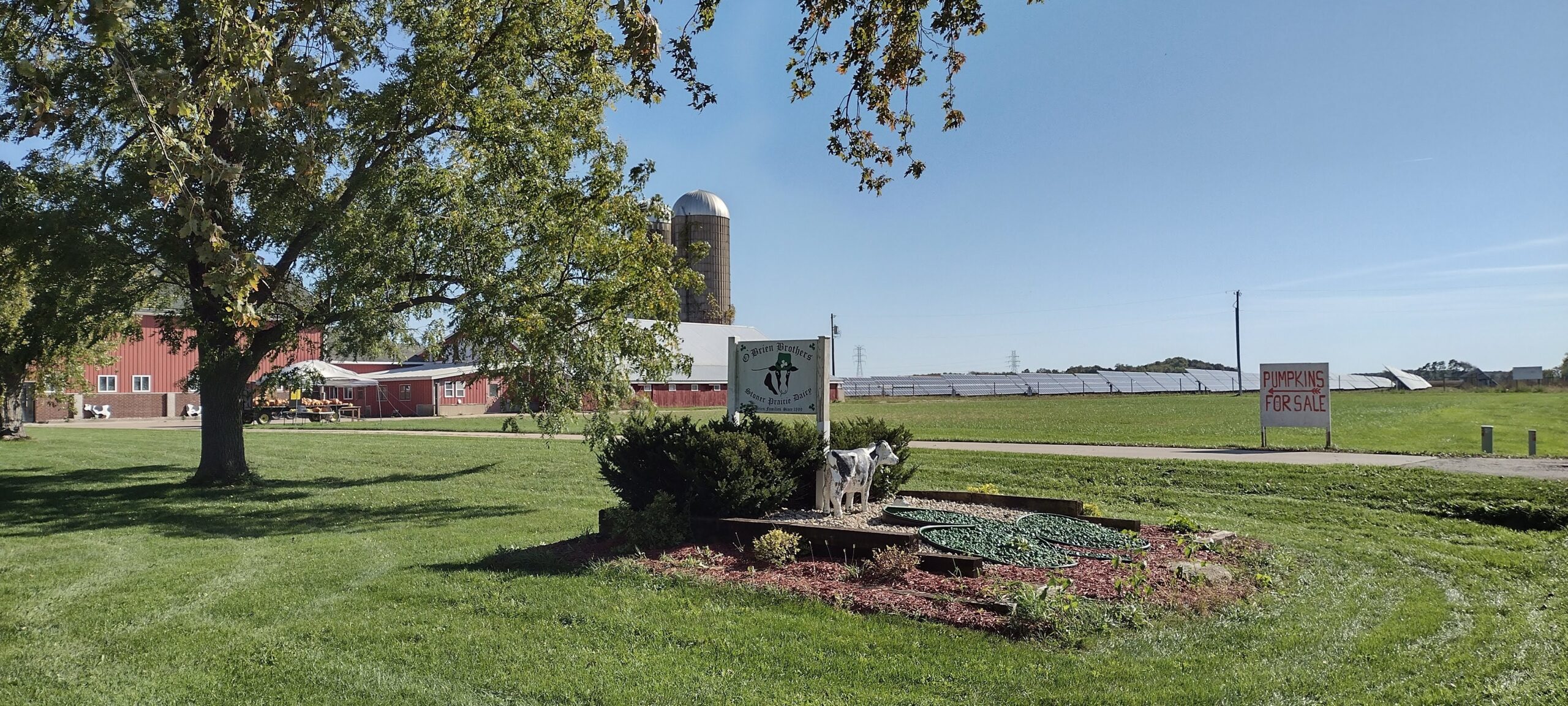 O’Brien Solar Fields in the city of Fitchburg, Wisconsin.
O’Brien Solar Fields in the city of Fitchburg, Wisconsin.
O’Brien Solar – Clean Energy Produced Offsite for Larger Customers
Occupying 130 acres along the edge of urban Fitchburg, O’Brien Solar Fields is as large as a distributed solar project gets. However, while every kilowatt-hour produced at O’Brien flows directly into Madison Gas and Electric’s distribution grid, only seven customers see the impact of this project on their utility bills. Those customers are the State of Wisconsin, University of Wisconsin-Madison, City of Fitchburg, Promega, Placon, Tribe 9 Foods, and Willy St. Co-op.
Energized this summer, O’Brien Solar is the newest Renewable Energy Rider (RER) project serving MGE customers. Several years ago, MGE received approval from the Public Service Commission (PSC) to build solar farms to serve individual customers, including those with multiple facilities, through its RER program. Unique to MGE, this service allows customers to be served by one larger solar farm instead of building numerous solar systems to supply each of their facilities.
A voluntary program, MGE’s RER program does not affect base electric rates. Participating customers fully absorb the cost of MGE’s investment in the solar arrays, and these costs are spread over 30 years. The electricity generated at O’Brien offsets grid power that would otherwise flow to these customers at specified prices throughout the contract term. Should standard electric rates rise faster than the agreed-upon pricing for O’Brien’s electricity, the savings will flow directly to the participating customers.
This unique model combines elements of both behind-the-meter generation and community solar power. But in order to entice customers to access brand-new yet low-cost sources of power, the project owner must design and develop projects that are competitive with the utility’s own avoided cost of power.
The question arises, what did MGE do to keep O’Brien’s development costs in line with its investments in larger solar projects and make it an affordable option for customers?
First, the project occupies only one parcel of land, the former Stoner Prairie Dairy owned and operated by the O’Brien brothers over several generations. Though the parcel is adjacent to a rapidly growing neighborhood, the project’s configuration allows the O’Brien family to maintain its most profitable farming operations as well as live in their long-time residence. Negotiating with only one landowner gives a developer more room in tailoring the project to avoid potentially expensive workarounds.
Second, from an electrical perspective, the project is divided into three zones, each with a separate interconnection to MGE’s feeder lines. By spreading out the project’s output in this fashion, MGE could forgo the more significant expense of running a large tie-in line to the closest substation.
Third, much like a 30-year residential mortgage, the RER contract is a powerful tool for breaking down a significant capital outlay into a manageable expense for the customer. Just as utilities rely on extended depreciation schedules to help them digest the costs of building central station power plants, the RER service provides a similar benefit to participating customers.
In the end, the all-in cost of O’Brien Solar Fields amounted to $29.5 million, which, on a unit basis, comes to $1,475 per kilowatt (kW). To put that number in perspective, the unit price of six larger solar farms totaling 414 MW that Alliant Energy proposes to acquire is $1,449 per kW. In fact, O’Brien’s unit cost is within 10% of the estimated cost of acquiring a 20 MW share of a project ten times as large.
Moreover, it took only three years for EDF Renewables, O’Brien’s original developer, and MGE to advance this power plant from the concept stage to fruition, a relatively speedy turnaround compared with larger solar installations.
Conclusion: The Policy Case for Smaller Solar Farms
Indeed, small solar farms can deliver affordable electricity at a reasonable price by avoiding the increased complexities and additional permitting hurdles associated with larger solar farms that tie into the transmission system. Moreover, while larger solar farms make a great deal of sense in areas rich in transmission infrastructure, relying solely on those locations would exclude much of Wisconsin from being able to host solar power.
There are many parcels of land throughout Wisconsin that have the requisite attributes for hosting projects on the scale of Strobus and O’Brien. In addition, projects of that size are ideal vehicles for community solar offerings, designed to deliver zero-carbon electricity to subscribing customers who cannot access solar power at their residence or business.
Over time, with increases in system power costs looking very likely, the state should explore and adopt policies to promote smaller solar farms within its boundaries. As exemplified by the Strobus and O’Brien projects, development on that scale can yield faster results at comparable costs while potentially providing a reliable revenue stream to the many thousands of landowners who don’t live near high-capacity transmission lines and substations.
Wisconsin is in the beginning stages of an energy revolution. With a more forward-looking policy framework, Wisconsin could emerge as a national leader in solar power. Embracing distribution-level solar solutions now will help more Wisconsinites participate in the benefits of these projects and give every city, town, and village a solar project to call their own. Wisconsin’s population is distributed throughout the state–our renewable energy portfolio should be as well.
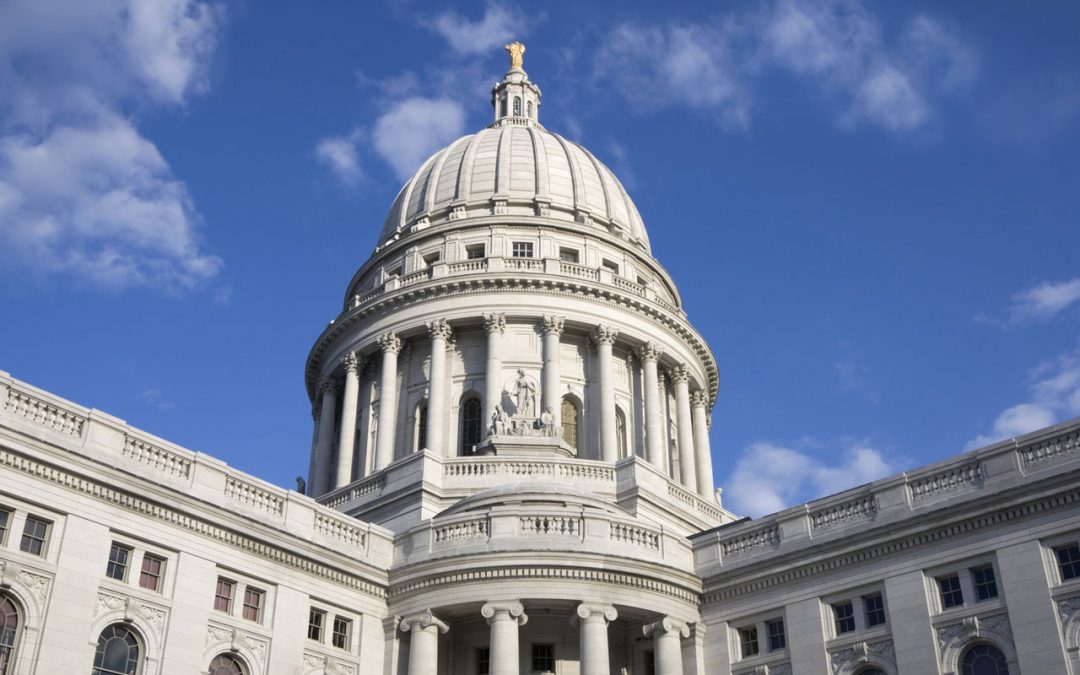
by RENEW Wisconsin | Oct 26, 2021 | Advocacy, Community, Community Solar, Electric Vehicles, Events, Home, Jobs, Legislative Watchlist, Local Government, Policy, RENEW Wisconsin, Renewables, Solar, Sustainability
On October 13, RENEW Wisconsin and Wisconsin Conservative Energy Forum (WCEF) hosted their first-ever Renewable Energy Day at the Capitol in Madison. The event included issue briefings by industry experts on a variety of legislation that has been introduced this year related to the solar and electric vehicle industries. Attendees then went to the State Capitol to speak with their legislators to gain support for these important issues.
During a welcome reception, the evening before the Day at the Capitol, RENEW and WCEF held a panel discussion “Energy in Transition: Policy and Politics.”
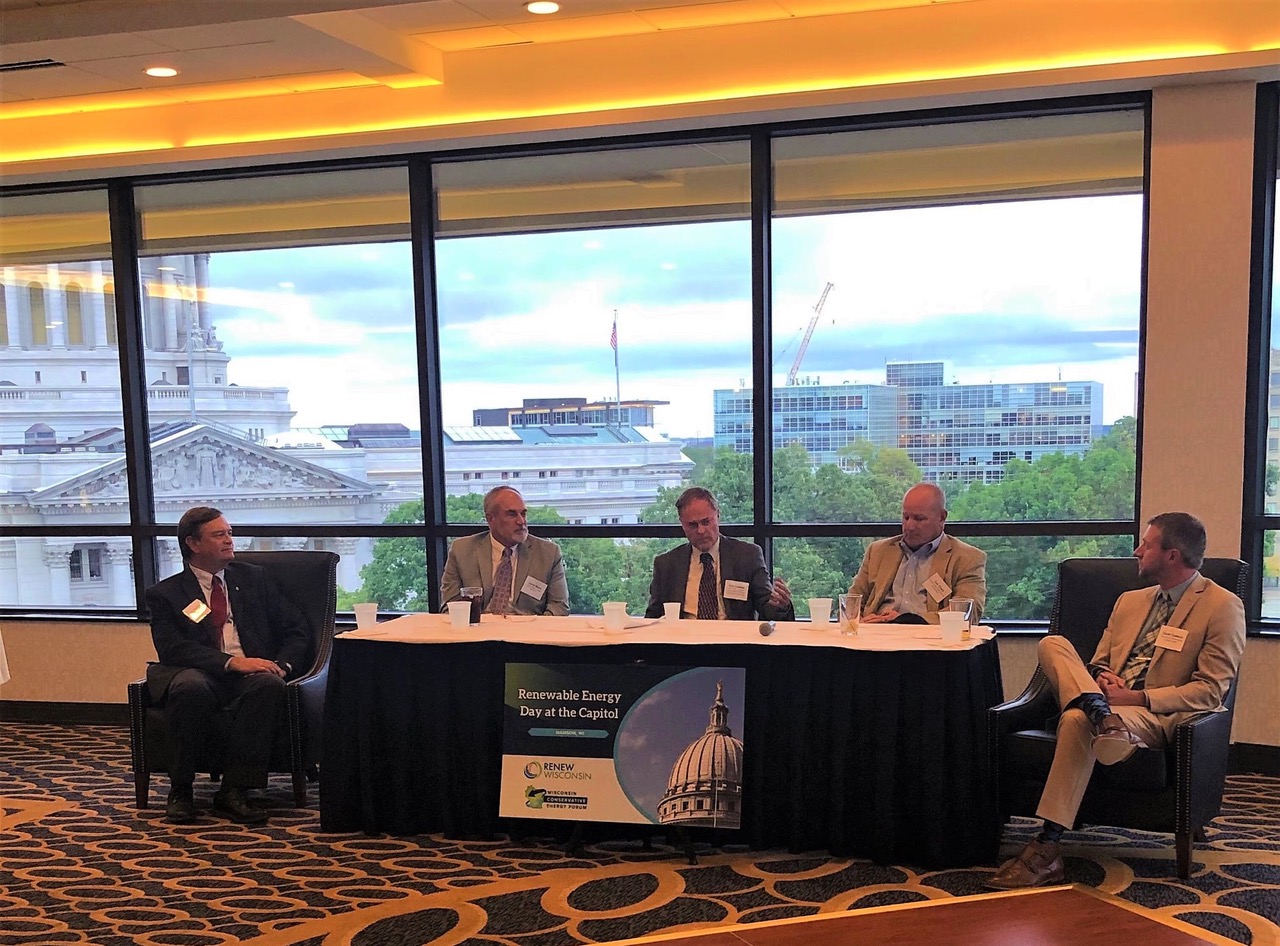
From right to left were moderator, Scott Coenen (WCEF), Dan Ebert (former PSC Chairman), Senator Rob Cowles, Larry Ward (Conservative Energy Network), and Jim Boullion (RENEW Wisconsin).
The panel discussed the current uncertainty in world energy markets and the impact that energy shortages and spiking prices will have on the world. There was consensus from the conversation that panelists believe renewables can help stabilize much of this energy uncertainty, but that the industry needs to be realistic about its role in a world where supply is not meeting demand. Businesses, households, and communities in Wisconsin should be empowered to invest in their own energy generation.
Before attendees went to the Capitol to meet with their legislators, there was an issue briefing with a panel of industry experts moderated by Jim Boullion, Director of Government Affairs for RENEW Wisconsin. The panelists explained in detail what legislative proposals were currently before the legislature, how they will impact renewable energy in Wisconsin, and what arguments are being made on both sides of the issue.
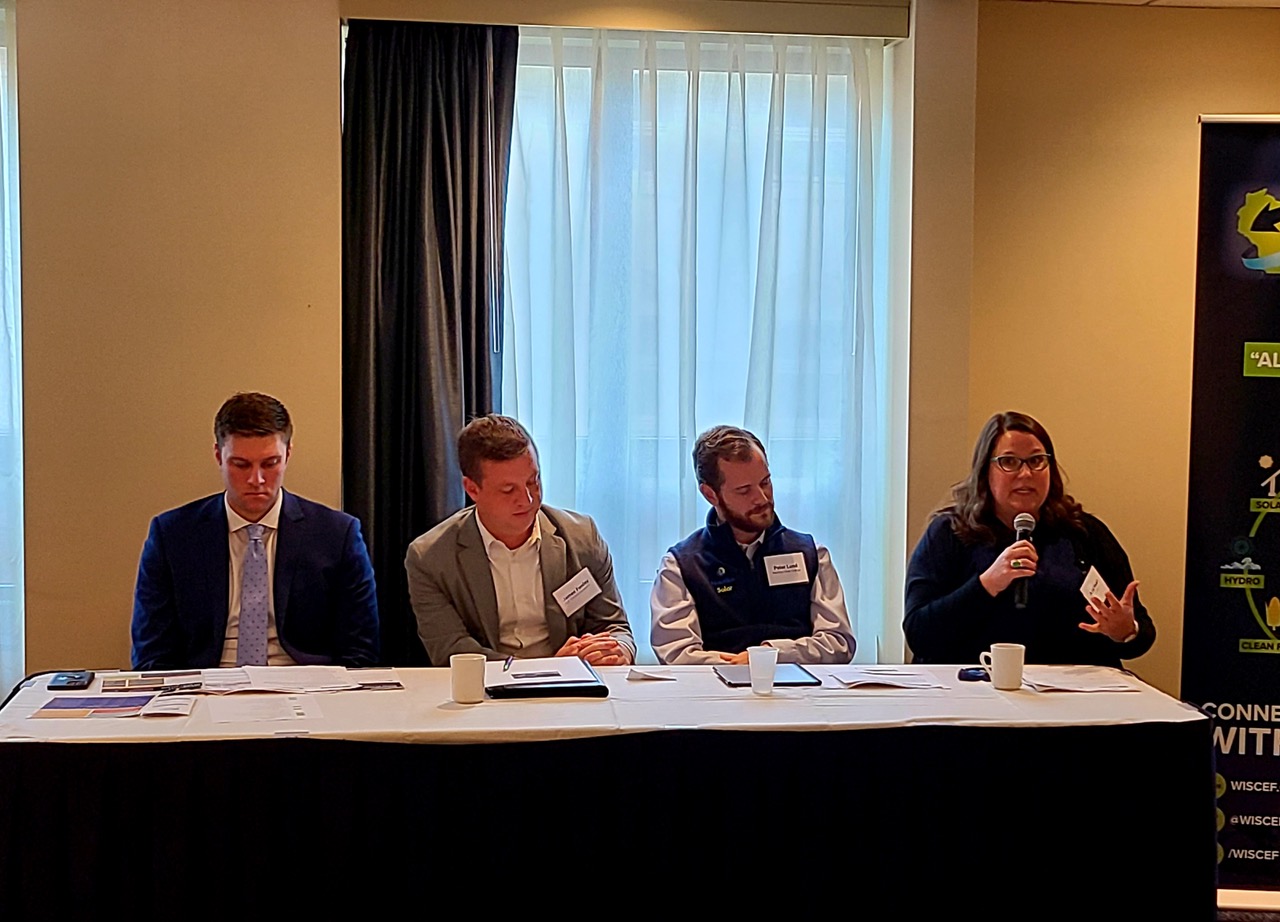
Issue briefing panelists, Left to right: Jason Mugnaini (Chief of Staff, State Senator Rob Cowles), James Fenley (SJL Government Affairs & Communications), Peter Lund (Financial Structuring Associate, Nautilus Solar Energy), and Amy Heart (Senior Director, Public Policy, Sunrun).
The first panel discussed two solar-related issues:
- Expanded Development of Community Solar – (SB 490 / AB 527 – Sen. Stroebel and Rep. Ramthun) This bill would authorize the development of non-utility owned community solar projects and provide access to the economic and environmental benefits of solar for those who can’t afford the full cost of a system, live in multi-family housing, or own property that is not suitable for solar.
- 3rd Party Financing/Leasing – (LRB 1550/1 Sen. Cowles and Rep. Cabral-Guevara) This legislation would clarify that 3rd party financing/leasing of renewable energy equipment is legal in Wisconsin, providing affordable financing options for people, businesses, municipalities, or not-for-profit entities who don’t have the resources to pay for solar on their own property.
The second panel, moderated by RENEW’s Jeremy Orr, Emerging Technology Program Manager, discussed electric vehicle issues such as Wisconsin’s recent Direct Electric Vehicle Sales legislation, SB 462 / AB 439 (Sen. Kooyenga and Rep. Neylon). Albert Gore, Policy and Business Development at Tesla, discussed how allowing manufacturers to sell electric vehicles directly to consumers creates greater access to the electric vehicle market, resulting in growth in the traditional dealership model. Read Jeremy Orr’s previous testimony on this issue here.
Likewise, Justin Ackley, Public Policy Manager at ChargePoint, spoke to the business clarity and consumer transparency that AB 588 / SB 573 (Sen. Cowles and Rep. VanderMeer) would provide, as it would allow non-utility-owned charging stations to charge by the kWh. Similar to a gas pump, where the price per gallon is displayed, kWh charging tells electric owners how much energy they’re paying for, regardless of how long it takes to charge their vehicle. The panel pointed out that while the main goal of this legislation is good, another section of it would create problems by prohibiting charging a fee if any of the electricity going through the EV charger comes from a non-utility source such as a solar+storage system.
Emerging technology allows EV chargers to be installed in areas, especially rural areas, that have inadequate grid infrastructure and can help limit costly spikes in energy “demand charges” for charging station owners. EnTech, a division of Faith Technologies based in Menasha, Wisconsin brought one of their portable solar+storage units to Capitol Square to demonstrate how the technology works and how flexible it can be. A similar system was set up at Bergstrom Ford in Neenah to help reduce the energy bills at their dealership. John Bergstrom, the owner of the dealership, told the story of why he worked with Faith Technologies to install the system in this podcast.
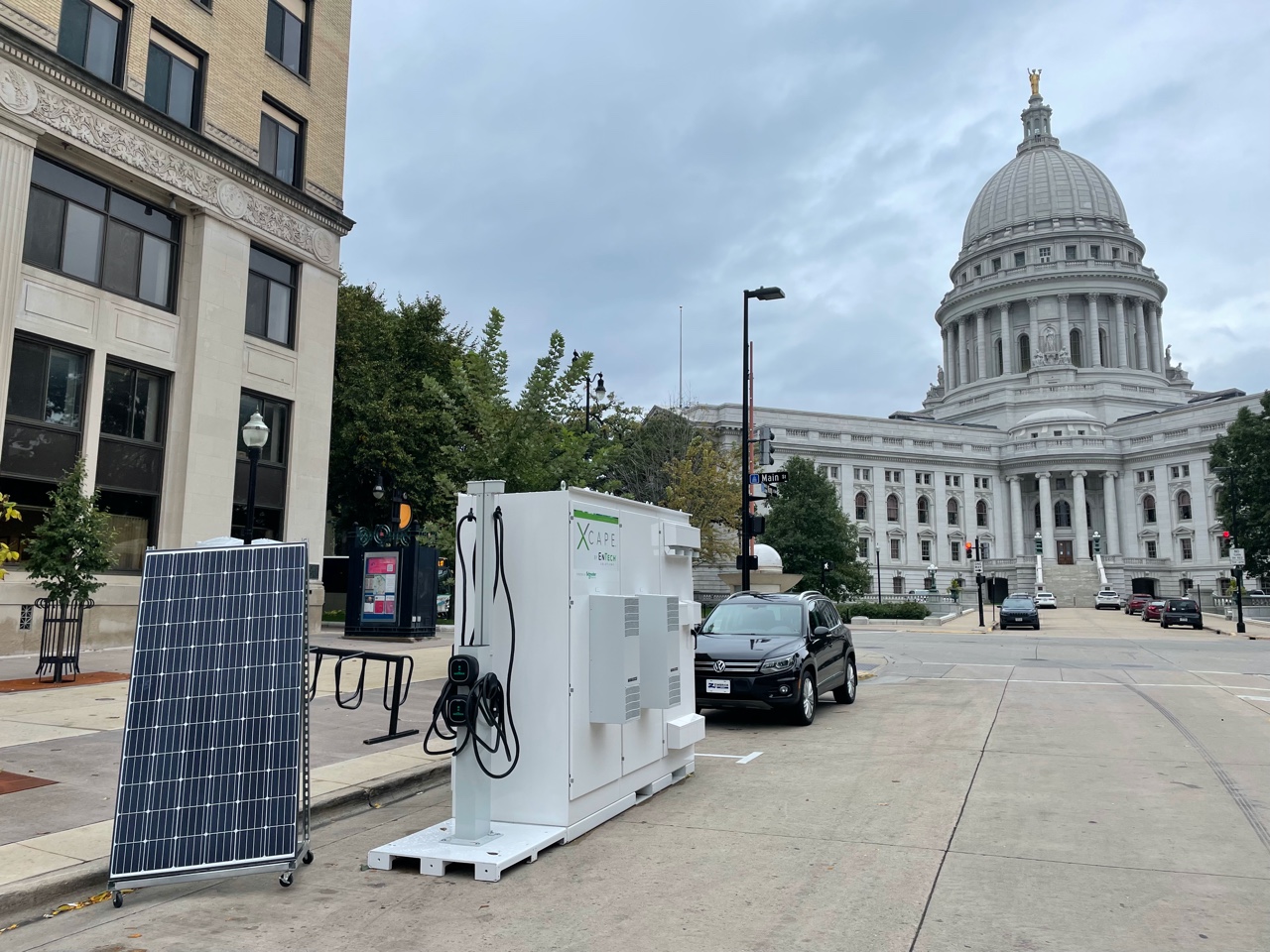
The panel closed the session by discussing two other bills recently introduced by Sen. Rob Cowles:
- $10 million in VW Settlement Funds for EV Charging Station Grants – (LRB-0254/1 Sen. Cowles and Rep. VanderMeer) Grants from these funds would be used to install electric vehicle charging stations at key locations throughout Wisconsin.
- Energy Storage Sales Tax Exemption – (LRB-1513/1) – Sen. Cowles and Rep. Duchow) This legislation would clarify that battery storage devices installed as part of a renewable energy system should be included in the sales tax exemption that already exists for renewable energy system equipment.
The 75 registered attendees made an impact by taking time out of their busy lives and getting involved in the political process. None of these issues will be easy to pass. In fact, most of them face significant opposition from powerful forces. But working together and building coalitions with pro-renewable energy friends helps get important legislation like this adopted.
If you would like to learn what you can do to help as well, contact Jim Boullion, Director of Government Relations at jim@renewwisconsin.org.
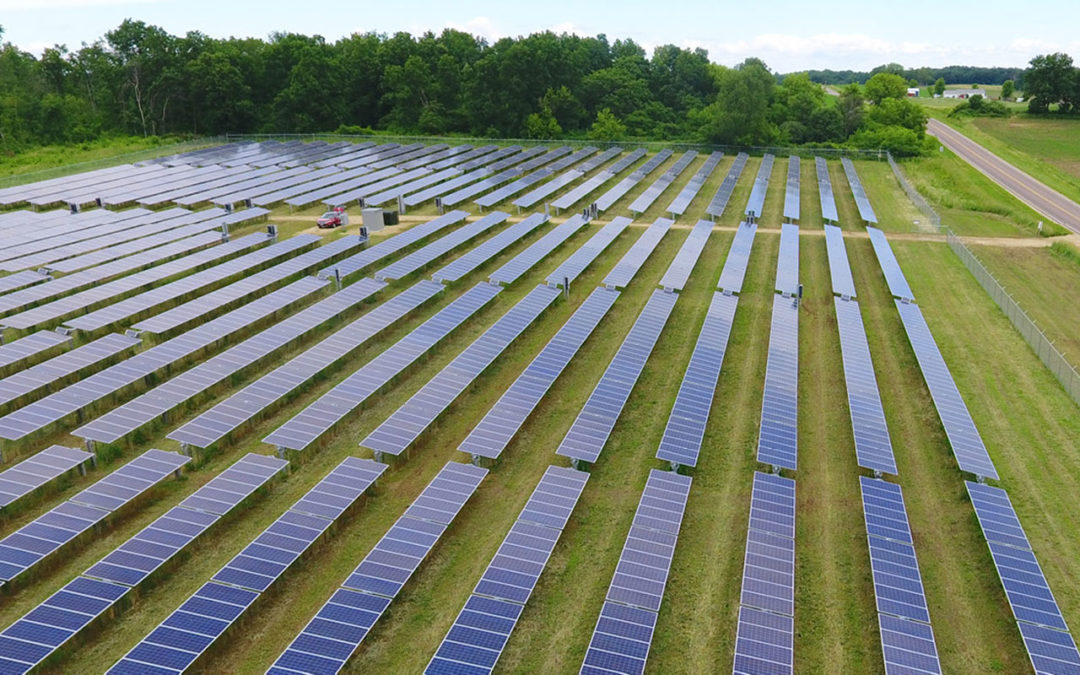
by Katelynn Samuelsen | Jul 23, 2021 | Advocacy, Community, Community Solar, Legislative Watchlist, Policy, Renewables, Solar, Utilities
This blog is from 2021 and does not reflect the 2023 iteration of the Community Solar Bill. For information on the current iteration check here.
Over the past few months, RENEW Wisconsin and our partners have been developing statewide policies that would expand customer access to community solar projects. The National Renewable Energy Laboratory defines community solar, also known as shared solar or solar gardens, as a distributed solar energy deployment model that allows customers to buy or lease part of a larger, offsite shared solar photovoltaic (PV) system. Community members subscribing to a solar facility receive credits for their share of the power produced, either in electricity bill savings or energy (kWh) credits.
New community solar projects are being rapidly developed around the country; 21 states, including Minnesota and Illinois, have already enacted policies that expand the community solar market between subscribing organizations and participating customers. Community solar deployment in the United States has achieved a five-year annual growth rate of 53%[1]. But, lacking statewide policies to promote community solar options, Wisconsin is quickly falling behind.
Since 2010, the number of solar energy systems purchased by US homeowners and businesses has grown tenfold. By the end of 2019, nearly two million homeowners and businesses were reaping the rewards from producing solar-generated electricity. Solar power is popular with many US consumers, and it has become an affordable option for many households and businesses. Yet access to solar power is limited. More than 50% of Wisconsin households cannot access solar energy onsite because they rent, live in multi-tenant buildings, have roofs that cannot host a solar system, or experience some other constraining factor.
In Wisconsin right now, only regulated utilities and cooperatives can provide energy from solar gardens to customers. A few utilities, like Madison Gas and Electric, offer a shared solar service that customers can enroll in today. However, most Wisconsin utilities do not currently have a comparable program available for their customers. That lack of access will persist unless state lawmakers adopt a modernized policy to promote a robust community solar marketplace.
Senator Duey Stroebel (R – Saukville) and Representative Timothy Ramthun (R – Campbellsport) have introduced legislation that would expand access to community solar in Wisconsin. This legislation enables the development of more community solar and supports energy freedom, expands customer choice, saves money on your utility bill, all while creating healthier and more resilient communities.
With a stronger statewide community solar policy, we would open the door for homeowners, businesses, schools, churches, and nonprofits to supply themselves with clean, affordable electricity from a local solar array.
Community solar legislation would benefit all utility customers by adding locally generated electricity to our energy grid while strengthening the rural economy at the same time. Community solar brings guaranteed savings for every subscriber as well as predictable and stable long-term energy costs. It gives customers a choice to support local clean energy projects while expanding access to affordable renewable energy for low-to middle-income residents.
Community solar expansion would allow more Wisconsin farmers to lease their land to host solar arrays and receive a guaranteed secure income for 25 years or longer. This drought-resistant cash crop is especially valuable for Wisconsin’s agricultural communities facing economic stress.
The soil underneath the panels can be planted with a variety of native plants and perennials. In addition to minimizing agricultural runoff and fixing nutrients in the soil, these perennials create a high-quality habitat for bees, butterflies, and other insects that move pollen in and around the fields and improve farm productivity.
When solar panels have reached the end of their useful lives, the equipment can be removed, and crop production can resume on the land that has become more fertile as a result of the native plantings.
A robust community solar market in Wisconsin will create thousands of jobs, spur hundreds of millions of dollars in economic growth, and save customers millions in utility bills. Community solar is proven to support economic development, expand consumer choice and bring clean energy to urban and rural communities across Wisconsin.
Learn more about the proposed community solar legislation at www.wisolarcoalition.com.
[1] The Vision of US Community Solar: A Roadmap to 2030
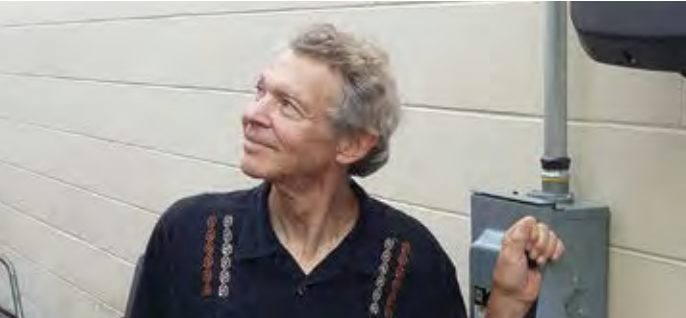
by Elizabeth Misel | Jun 4, 2021 | Community, RENEW Wisconsin, Renewables
In 1991, Don Wichert saw a need for an organization to advocate for Wisconsin’s renewable energy future. As founder and first executive director of RENEW Wisconsin, Don set forth on his mission to promote the development and use of renewable energy resources in the state of Wisconsin. Thirty years later, RENEW is a thriving and growing nonprofit organization working towards clean energy powering a strong, healthy, and vibrant Wisconsin.
RENEW Wisconsin’s accomplishments over the past 30 years are part of Don’s legacy. But there is more work to be done, and Don knows RENEW needs a stable financial foundation to continue its work for another 30 years. He worked with Madison Community Foundation to create a RENEW Wisconsin Charitable Gift Annuity and the RENEW Endowment Fund to ensure a financial pipeline for our clean energy future.
CHARITABLE GIFT ANNUITY
For donors interested in taking a charitable deduction on their taxes in the current year while still receiving income from those assets, a charitable gift annuity (CGA) offers the opportunity to achieve both goals. CGAs allow you to make a current tax-deductible gift to benefit RENEW Wisconsin while still receiving a lifetime annual income.
The idea of a charitable gift annuity was very appealing. The guaranteed interest rate was high enough to make it a reasonable investment during my lifetime. And the CGA provides tax benefits too…RENEW, and the work that it does is my legacy.
Don Wichert, RENEW Wisconsin Founder
RENEW ENDOWMENT FUND
The RENEW Endowment Fund supports paid internships from the Energy Analysis and Policy Program at UW-Madison. This endowment allows RENEW to offer a hands-on, real-life job experience to future leaders in renewable energy.
The RENEW staff gave me the trust and mentorship I needed to become a strong clean energy policy advocate. I was able to grow my utility regulation knowledge, energy education skills, and Midwest clean energy network. Thank you, RENEW WI, for being my strong stepping stone into the clean energy industry.
Lauren Reeg – Energy Analysis and Policy Intern
You have the opportunity to help create a cleaner, stronger, more vibrant Wisconsin by setting up a Charitable Gift Annuity listing RENEW Wisconsin as the beneficiary and/or giving to the RENEW Endowment Fund. Madison Community Foundation makes giving incredibly easy.
I can help facilitate communications with Madison Community Foundation to start planning your legacy now. Contact me at: Elizabeth@renewwisconsin.org or call 608-255-4044 ext. 7
by Jeremy Orr | Apr 29, 2021 | Community, Electric Vehicles
Last Thursday (April 22), RENEW Wisconsin partnered with the Dane County Office of Energy and Climate Change and Slipstream on the 2nd Annual Earth Day Electric Vehicle (EV) Parade.
Several dozen EV owners and car dealers gathered in Madison with an assortment of all-electric vehicles, hybrids, and electric motorcycles, including the new Ford Mustang Mach-E, BMW Roadster, and the Harley LiveWire Motorcycle, amongst other makes and models.
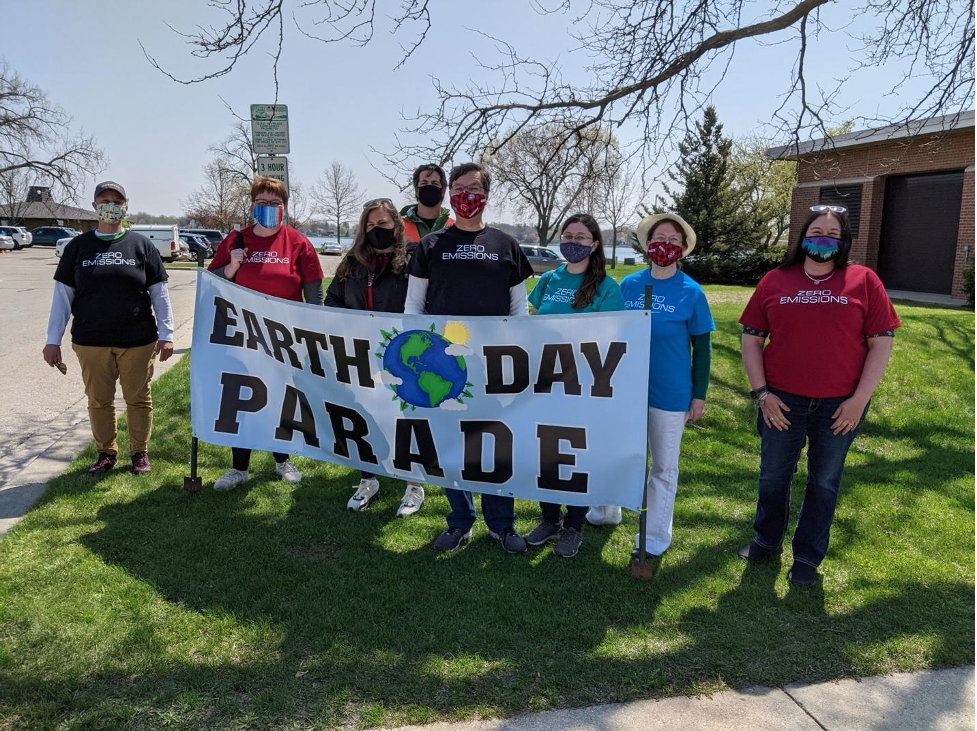
Parade participants started at Brittingham Park in Madison, drove through the city and Capitol Square, and then returned to Brittingham Park. You can watch the parade on Channel 3000.com.
The parade was inspired by EV drivers who see the transition to electric vehicles as another tool in the fight against climate change. Other EV owners mentioned that EVs are fun to drive and even stand up to the challenges of Wisconsin’s cold winters!
For more information about the parade or upcoming electric vehicle events, please contact Jeremy Orr at (608) 210-1428 or jeremy@renewwisconsin.org.

 Governor Evers and the Project Developer, Eric Udelhofen, from OneEnergy Renewables at the Ribbon Cutting Ceremony for the Strobus Solar project.
Governor Evers and the Project Developer, Eric Udelhofen, from OneEnergy Renewables at the Ribbon Cutting Ceremony for the Strobus Solar project. O’Brien Solar Fields in the city of Fitchburg, Wisconsin.
O’Brien Solar Fields in the city of Fitchburg, Wisconsin. 







